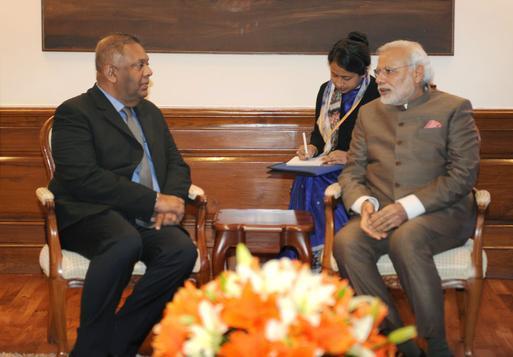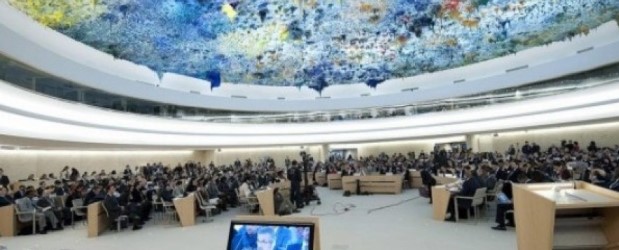[ UNHRC in session]
Prime Minister Narendra Modi with Foreign Minister of Sri Lanka, Mangala Samaraweera at a meeting in New Delhi on Monday
by Suhasini Haidar–
He pledged India’s continued support to the close neighbour and “friend.”
The new Sri Lankan government will take a different position from the Rajapaksa regime when it comes to dealing with the international community on allegations of human rights violations, visiting Sri Lankan Foreign Minister Mangala Samaraweera has told the Indian government.
“Our government will take a new approach to the U.N. Human Rights Council process in Geneva. We will offer a domestic mechanism for this, which could be supported by international agencies,” he said.

Asked if President Maithripala Sirisena, who was the acting Defence Minister for a short period during the end of the LTTE war when most of the atrocities are believed to have occurred, would himself explain the Army’s actions, Mr. Samaraweera said: “My President will cooperate fully with a domestic investigation into the issue.” Speaking to a group of media organisations after his meeting with Prime Minister Narendra Modi on Monday, Mr. Samaraweera said his meetings in Delhi had been “warm and fruitful,” even as the leaders announced a host of upcoming bilateral meetings.
Mr. Sirisena is expected to visit India in February, his first international visit after taking over. Mr. Modi will visit Colombo in March, which would be the first state visit by an Indian Prime Minister to Sri Lanka since 1987. External Affairs Minister Sushma Swaraj will travel to Sri Lanka ahead of that and also chair the India-Sri Lanka Joint Commission meeting at the time.
In the new Sri Lankan government’s most detailed explanation so far of its reconciliation policy for the Tamil-majority provinces, Mr. Samaraweera told Indian journalists that the government had already moved on two demands of the TNA government. To begin with, Mr. Sirisena replaced the military governor of the Northern Province with former U.N. official and diplomat H.M.G.S. Palihakkara, a promise the former President, Mahinda Rajapaksa, had made but never delivered.
The government was also identifying people whose land had been in military use. It would reverse their relocation, he said. While ruling out an international inquiry of the kind pushed for by the U.S., and cleared by the UNHRC in 2014, Mr. Samaraweera hoped that some middle ground would be worked out during this year’s meeting in Geneva in March. Much of the acrimony towards Sri Lanka at the UNHRC was “brought upon Sri Lanka by the previous government’s position,” he said. He also said the government was committed to implementing the contentious “13th amendment” of the Constitution on devolution of powers to Tamil-majority areas, but would start discussions with all parties after the next parliamentary elections.
While downplaying concerns about the resurgence of the LTTE among the Tamil diaspora, Mr. Samaraweera said the new government would welcome back all Sri Lankans who had fled the country over the past few years
